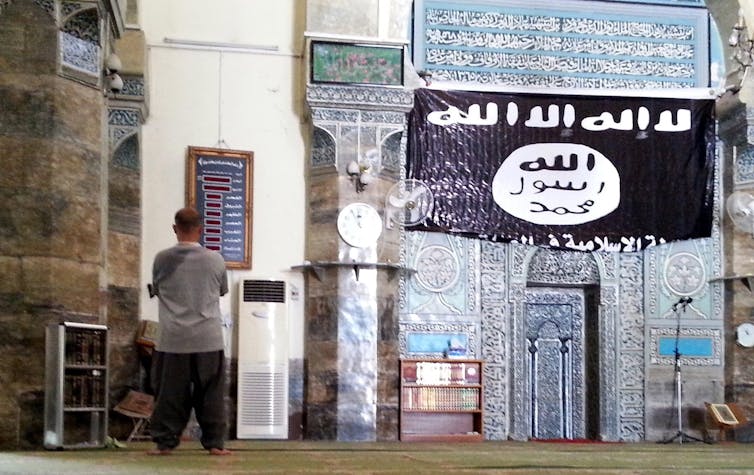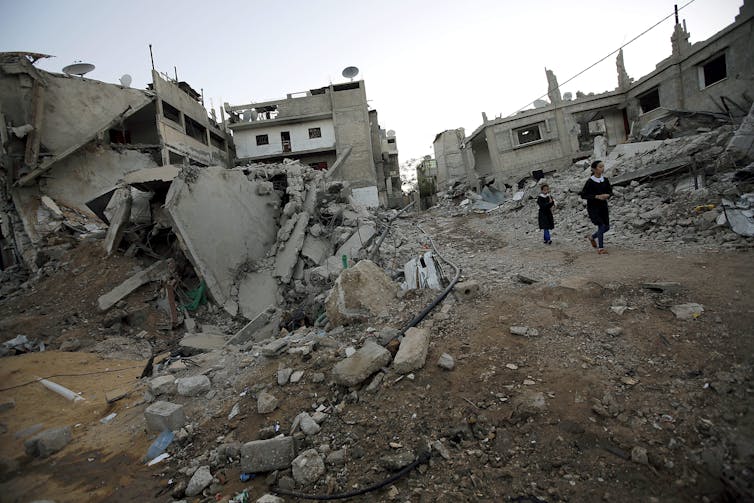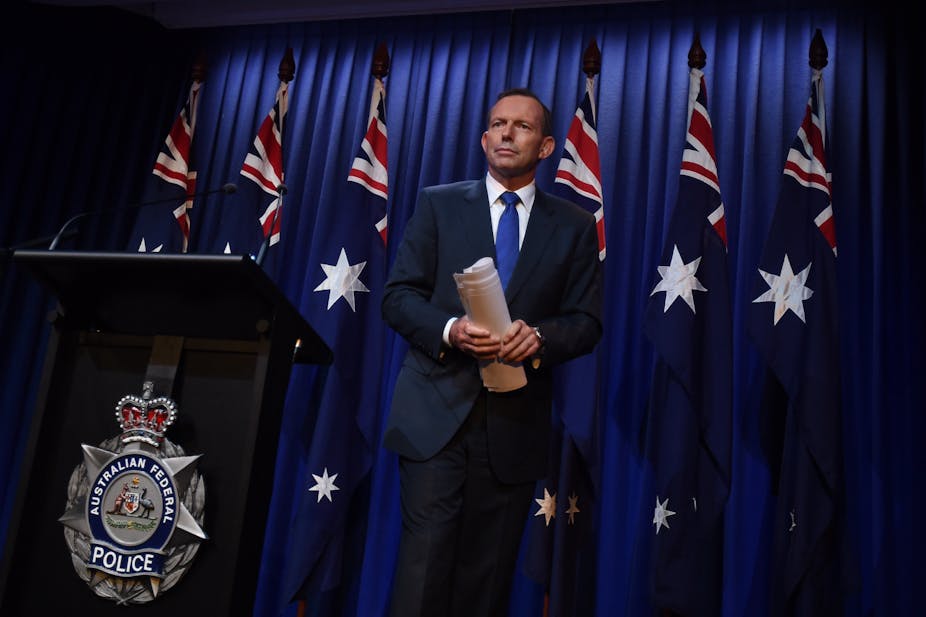Governments contrive moral panics to consolidate domestic political support. An alleged “existential” foreign threat is particularly useful. It encourages the population to rally behind the leader, accept restrictions on their civil liberties and support higher levels of funding for the military and intelligence sectors.
The veracity of the threat is almost irrelevant. What matters is that the public buys the danger.
In Overblown, American political scientist John Mueller exposed how politicians and the terrorism industry grossly exaggerated the threat of terrorism after 9/11.
Australia’s reaction to revelations that its citizens were fighting for Islamic State (IS) in Syria and Iraq follows precisely the same pattern of intellectual and state fear-mongering. It’s almost a perfect case study of a contemporary moral panic.
After an unprovoked intercession in a vicious sectarian conflict in Mesopotamia, former army chief turned academic Peter Leahy said Australia was in for a “long war” against “political Islam” that would last for “100 years”. He worried that the public was ill-prepared to pay the necessary price in “blood and treasure”. It would be a fight requiring pre-emptive and reactive action, both on home soil and foreign lands.
Not to be outdone in hyperbole, Attorney-General George Brandis declared IS to be an “existential threat to us”. Prime Minister Tony Abbott said the dangers were “unprecedented”. Foreign Minister Julie Bishop claimed these particular Islamists were:
… the most significant threat to the global rules-based order to emerge in the past 70 years – and included in my considerations is the rise of communism and the Cold War.
This was an extraordinary suggestion. But Bishop’s speech was apparently insufficient to mobilise public fear about the scale of the threat the nation suddenly faced. It wasn’t long before she invoked the spectre of IS terrorists with weapons of mass destruction – chemical weapons and dirty uranium bombs – again, as in 2003, without producing any evidence for such claims.
In a recent speech, Bishop also explained IS’s origins. But missing entirely from her analysis was an acknowledgement that the West’s invasion of Iraq in 2003, and its subsequent occupation, had any role in fomenting the conditions that gave rise to IS.
Omitted too from Bishop’s account were the financial contributions of Saudi, Kuwaiti and Qatari elites to their Sunni co-religionists, presumably because they are now posing as the West’s allies in this latest Babylonian struggle. Turkey’s porous border, across which oil, arms and militants freely flow into IS-held territory, also fails to gain a mention.
Instead, it is the democratic uprisings in North Africa and the Persian Gulf in 2010 and 2011 that produced fertile conditions for IS’s rise. According to Bishop:
The Arab Spring for all its potential as an example of grass roots democracy movements rising up against authoritarian regimes, in fact left behind chaos and instability – creating a breeding ground for terrorist cells. One of the most brutal was al-Qaeda in Iraq under the ruthless leadership of Abu Musab al-Zarqawi, who was among the first to use beheadings as a tool of terror.
Bishop did not explain the mystery of who al-Zarqawi was actually fighting in Iraq, presumably because the illegal invasion and occupation by Western military forces remains taboo. It cannot be easy delivering a major speech on the war against IS without mentioning what was happening in the country between 2003 and 2011. Or how so many former members of Saddam Hussein’s army ended up fighting for IS.
However dubious her historical narrative, Bishop’s invocation of the Arab Spring is nevertheless a perspicacious lens through which to examine the relationship between the West and radical Islam. It reveals a very different history to the one framed by official orthodoxy. It tells us a good deal more about the main currents of contemporary US foreign policy than the moral panic that currently prevails.
The Arab Spring, Islamists and the West
In the Arab Spring’s immediate aftermath, conservatives and statists expressed concern about the Islamist Muslim Brotherhood’s rise in post-Mubarak Egypt – as if the 1979 Iranian revolution was about to be reprised. To their great relief, the military coup and counter-revolution led by General Abdel Fattah el-Sisi, strongly backed by the US, soon restored the previous status quo.
Orthodox narratives in the West argued that the “war on terror” was another chapter in the US’s long-standing opposition to Islamic fundamentalism. Although the US always encourages the spread of democracy, regrettably it must sometimes support dictatorships in the Middle East because they maintain regional stability, support the West’s counter-terrorism strategy, and the alternatives – Islamists such as those in Iran, southern Lebanon and Gaza – are always much worse for Western interests.
According to this counter-terrorism message, the rapid overthrow of democracy in Egypt and the restoration of military rule was necessary to thwart and reverse the rise of Islamists to power in the most significant state within the Arab world. Unsurprisingly, the West’s most recent intervention in Iraq’s sectarian conflict is also presented as a continuation of this struggle against religious extremists and terrorism.
If governments are to maintain public support for their military ventures, war narratives must be kept simple and consistent. The underlying message since 2001 must not change: the West is always the innocent victim of terrorism, never its perpetrator.
Two questions arise from the response of leading Western states to the Arab Spring in North Africa and the Middle East. The answers tell a very different story about the West’s attitude to Islamic fundamentalism since the 1950s.
What precisely was being “stabilised” in countries such as Egypt? If nothing else, the Arab Spring demonstrated not only the limitations of realist theory with its uncritical faith in power and stability, but also the morality of supporting dictators who repress and impoverish their populations.
Naïvely, the West thought that deals struck with corrupt and brutal local elites, who ignored the legitimate aspirations of their peoples, would hold indefinitely. Despite billions spent on intelligence gathering and military bribes, the stunning events that broke out across the region in 2010, and intensified the following year, took them completely by surprise.
Significantly, none of the rebellions against pro-Western tyrants were inspired by the West. They were fiercely opposed by the US and the government of what professes to be the only democracy in the Middle East – Israel. These were endogenous revolutions.
The US’s remaining regional clients, in Bahrain, Kuwait and Saudi Arabia, watched these developments in horror. They soon realised that when domestic pressure for reform becomes politically organised, the US will abandon them to an ominous and uncertain fate. Unsurprisingly, they responded with a mixture of bribery and repression, without any meaningful expressions of concern from their Western backers.
Why must Arabs vote only for political groups that are acceptable to the West? Engendering a panic by portraying the Muslim Brotherhood as yet another bogeyman for the West reeked of neo-colonialism – a never-ending attempt to shape the political destiny of others. For conservatives it’s a difficult habit to shake.
As in the case of Gaza when Hamas was elected to power in 2006, it appears that democracy in North Africa, the Persian Gulf and the Levant is only a good thing if the right people come to power.
Those Egyptians in Tahrir Square who risked their lives for a democratic future in 2011 will not quickly forget that, in the critical hours of their struggle, the US maintained its support for Mubarak until popular protests rendered that policy untenable. This follows a pattern established with Marcos, Suharto, Chun, Duvalier and other former clients of the US.
Egyptians understood that the US, despite its lofty rhetoric, was more interested in Egypt’s peace treaty with Israel and keeping the Suez Canal open than it was in supporting a democratic transition.
In this particular case, the US’s posture completed a full circle. From dogged support for the Mubarak dictatorship to sudden champion of the democratic tide, it soon returned to its traditional stance - backing military rule and the reversal of democratic gains painfully, if only temporarily, won by the Egyptian people. There is no better illustration of the US’s flexible attitude to democracy than its policy towards Egypt between 2011 and 2013.

The US and Islamists
A third question is more important to answer if we are to fully explain the West’s policy response to these events, and those that preceded them. Is the anti-fundamentalist narrative, which the US consistently espouses as the foundation of its approach to the Muslim world, grounded in historical truth? Has it always had a problem with Islamists?
Since the 1950s, the US has paved the way for the rise of Islamic fundamentalism by using its most extreme reactionary elements to attack secular nationalism across the Muslim world, from Egypt to Afghanistan. This is not because it prefers political theocrats, but because it dislikes independent, nationalist governments even more.
So, why do outsiders – those in the West – consistently pave the way for Islamic extremists?
Islamic fundamentalists represent the greatest danger to those modernising secular governments in the Islamic world that want to pursue an independent course of economic development. The US has rarely hesitated to back militants with money and arms, regardless of local popular opinion or the extreme positions of the recipients of US arms and money.
Using the “Saudi model” to counter nationalism, communism and various secular left- wing and progressive currents in the region, the US’s policies frequently led to Islamic fundamentalists prospering as the most powerful and well-organised political movements left in each country.
Given the mutually beneficial oil deals struck between the Saudis and the West, religious zealots were not thought to pose an obvious threat to Western interests. They often appeared to be amenable to co-optation.
Here are just eight examples where US opposition to secular nationalism and support for militant Islamists has been decisive:
opposition to President Gamal Abdel-Nasser in Egypt in the 1950s;
overthrow of Prime Minister Mohammed Mossadegh in Iran in 1953;
opposition to Prime Minister Abdul-Karim Qassem in Iraq in 1963;
support for General Muhammad Zia-ul-Haq in Pakistan through the 1980s;
support for the Mujahideen in Afghanistan during the 1980s;
overthrow of President Saddam Hussein in Iraq in 2003;
overthrow of General Muammar Gaddafi in Libya in 2011; and
attempts to overthrow President Bashar al-Assad in Syria since 2011.
In almost every country where the US now claims to confront radical anti-Western Islamists, it either supported groups just like them to overthrow secular nationalists or inadvertently cleared the way for their rise by undermining or overthrowing secular governments. Riding the Islamist horse may have seemed the best way to prosecute the Cold War in the Middle East and Central Asia. But to suggest the implications of this strategy were not fully thought through fails to capture the scale of the catastrophes that have ensued.
As many analysts have noted, the rise of IS, and its predecessor organisation al-Qaeda in Iraq, was a direct result of the US’s destruction of Iraq’s sectarian balance and secular government after the invasion in 2003, consolidated by the subsequent occupation of the country.
Although Western leaders keen to escalate in Iraq again would prefer the connection and history was forgotten, there is no escaping that the US, UK, Australia and others played midwife at IS’s birth and a range of other militant groups now traumatising Iraq and Syria. They do it again and again, most recently in Libya – which was supposed to be a showcase of humanitarian intervention.
Given the US’s long-standing political and financial support for fundamentalists across the Muslim world, how seriously should we take its post-9/11 confrontation with radical Islam? Its complex relationship with the extreme Islamists running Saudi Arabia is a good starting point for analysis. However, that bilateral relationship cannot explain a pattern of behaviour that extends across the Arab world, Persia, Central Asia and the sub-continent.
One explanation for these events argues that the US has been the victim of “blowback”: the unintended consequences of earlier policies, a CIA thesis popularised by the late Chalmers Johnson. Between 1950 and 1990, anti-Communism trumped all other considerations, so the consequences of supporting religious zealots was not understood until it was too late. The US is guilty of naïveté and short-term thinking, of having to make a number of invidious choices, but little else.
This argument, shared by many realists who emphasise power and stability above all other considerations, almost forms a consensus on the left. But it is ultimately unconvincing – it fails to account for the underlying motivation behind US foreign policy over the last six decades.
This blowback argument absolves and conceals the US’s responsibility for Islamic fundamentalism’s rise. It allows the US to present itself as a victim – of its own best intentions – but a victim nonetheless.
In truth, the US knew exactly what the Wahhabis, Muslim Brotherhood, Mujahideen and Taliban were like, and the consequences of supporting them. It didn’t care or, more likely, it didn’t mind. They were an effective antidote to the appeal of secular nationalists and communists, so they were used.
The US also likes that Islamists tend to be state capitalists, opposing – in principle – class-based politics. Islam is a pro-capitalist religion and the perfect foil to secular socialism.
The US’s real enemy since the 1950s has been called “radical”, or more accurately, independent nationalism – especially economic nationalism. Mostly, this was secular (see Nasser in Egypt), though in the case of Iran after 1979 (for example), it was religious. This is the most important and consistent current running through US foreign policy since the end of the second world war.
The same approach fashioned US policy towards communists in Vietnam, the Allende regime in Chile, Castro in Cuba, the Sandinistas in Nicaragua and Saddam in Iraq – among others. Friends and enemies of the US during the Cold War were not determined by the strategic threat they posed (which, with the exception of the USSR, was mostly negligible), but by the extent to which they complemented the US’s global economic needs, including trade and resource access, opportunities for foreign investment and the capacity to repatriate profits.
States that exhibited nationalist priorities and refused to play by the US’s rules, such as those in the Soviet bloc, were a danger to the health of the US economy and therefore considered enemies. They posed a threat to an open world economy and, just as importantly, represented an example of an alternative model of economic development which was antithetical to the US’s. Inevitably, they became victims of the US’s promiscuous interventions.
Once China opened itself up to capitalist enterprise in the 1980s it was removed from the enemies list despite remaining politically communist. The same happened to Vietnam after businessmen from Europe arrived. Presumably the same will now be true for Cuba.

To complement and control
The crucial factor in explaining Western policy towards the Arab and Muslim worlds, therefore, is not whether nationalism in these countries was secular or religious, but that it was independent. The propaganda cover – “communism”, “democracy” or “terrorism” – simply reflected the most utilitarian discourse of the day. Whichever approach lent itself most effectively to domestic opinion management would be used, though fear has been a consistent theme.
The US is not primarily concerned about ideologies or religious convictions per se. Fundamentally, it is concerned about control and disobedience. Independence amongst the vassals has always been its biggest worry.
A similar fear has shaped Israel’s policy towards the Palestinians and the region. When the most important nationalist force in the Palestinian territories was the secular Palestine Liberation Organisation (PLO), Israel supported Hamas as a countervailing political movement. Israel was not concerned by Hamas’ Islamist ideology.
When Hamas emerged as a significant political player in Gaza, Israel reverted to backing the more pliable and compromised PLO. Again, the discourse of “terrorism” and “Islamic fundamentalism” – whether it is directed at Hamas, Iran or Hezbollah – is little more than a pretext to sell policies which derive from other concerns. What counts is who can and cannot be controlled.
The US is currently backing the world’s most extreme Islamist state, Saudi Arabia, and its equally undemocratic Gulf allies, in a vicious war against Houthis in Yemen. Predictably this is another civilian catastrophe, though undoubtedly a blessing for al-Qaeda in the Arabian Peninsula, which is based there.
In what some consider a proxy struggle between Saudi Arabia and Iran, the US is unconcerned by Saudi sponsorship of Sunni militancy. That was the case previously, whether the money was spent in Pakistan, Afghanistan or Iraq. State terrorism, whether it is delivered by US-made drones targeted by the CIA or US-supplied fighter bombers flown by Saudi pilots, is one and the same crime.
This particular approach to global politics has always extended well beyond the Middle East. Hypocrisy and double standards tend to prevail everywhere.
Turkey is allowed to invade and illegally occupy northern Cyprus since 1974 without sanctions imposed by the West. It remains an important member of NATO and a close partner of the US in its wars against Iraq. Outside of Greece and the Greek Cypriot community, its invasion and occupation is largely forgotten and rarely raised.
Similarly, Israel is only able to illegally colonise the West Bank and Golan Heights, and blockade Gaza, with the US’s explicit political and financial support. The US is so deeply implicated in Palestine’s misery that it is more accurate to refer to the joint Israel-US occupation of the territories.
However, when Russia invaded and annexed Crimea with a much more compelling strategic rationale than Turkey could muster with Cyprus, it was immediately subject to harsh economic sanctions and other penalties. Putin is demonised for his irredentism and said to be set on a course for war with the West. There is little, if any, mention of NATO’s eastward expansion or the economic lure being set for Ukraine by the European Union.
The lesson is clear. Play by the rules and, like Turkey and Israel, you will be allowed to maintain your illegal occupation of other peoples’ land. But you defy the West at your peril. It is always about obedience.

Our responsibilities
Among the media commentary ascribing contemporary terrorism to some deformation of Islam by an extremist minority, the most important question is assiduously ignored: what responsibility does the Western world bear for creating the conditions that have resulted in the recent attacks in Ottawa, Sydney and Paris?
After all, we are responsible for the predictable consequences of our actions, a responsibility that extends to the policy choices of our governments to the extent that we live in an accountable democratic state. We are not responsible for the actions of others over whom we have limited – if any – influence.
For our political leaders the answer to this question is easy: none.
Echoing John Howard after the 9/11 attacks, when Abbott announced last September that Australia was committing military forces against IS in Iraq, he claimed:
… these terrorists and would-be terrorists are not targeting us for what we have done or for what we might do, they are targeting us for who we are, they are targeting us for our freedom, our tolerance, for our compassion, for our decency.
Abbott’s rationale repeats the presupposition at the basis of Western approaches: we are always the innocent victims of terrorism, never its perpetrator. We have nothing to explain, change, or apologise for.
This view, popularised by leaders after 9/11 and almost every subsequent terrorist attack, is not shared by those in Western governments charged with examining this very issue.
In 2004, Donald Rumsfeld directed the Defence Science Board Task Force to review the impact of the Bush Administration’s policies, specifically the effects that its wars in Afghanistan and Iraq were having on terrorism and the radicalisation of Muslims. The report’s conclusions were damning. The “underlying sources of threats to America’s national security” were “negative attitudes” towards the US in the Muslim world and “the conditions that create them”.
These conditions included “American direct intervention in the Muslim world” through its “one-sided support in favour of Israel”, support for tyrannies in Egypt and Saudi Arabia and, primarily, “the American occupation of Iraq and Afghanistan”. These occupations were seen to:
… be motivated by ulterior motives, and deliberately controlled in order to best serve American national interests at the expense of truly Muslim self-determination.
Strikingly, the Department of Defence report came to precisely the opposite conclusion from Howard, Abbott and before them George W. Bush, specifically that:
Muslims do not ‘hate our freedom’, but rather, they hate our policies.
Six years later, a similar view was expressed at an inquiry into the Iraq war held in the UK. When Baroness Manningham-Buller, Director-General of the Security Service (MI5) from 2002 to 2007, was asked how significant the Iraq war was in radicalising British Muslims, she replied that in her view it was “highly significant”:
Our involvement in Iraq radicalised, for want of a better word, a whole generation of young people … who saw our involvement in Iraq, on top of our involvement in Afghanistan, as being an attack on Islam.
In her evidence, Manningham-Buller said young British Muslims:
… saw the West’s activities in Afghanistan and Iraq as threatening their fellow religionists and the Muslim world [which in turn] increased the threat [to British civilians].
By positioning ourselves on a moral summit from which we can look down upon those who do not reach our giddy standards, a sense of superiority may help focus our attention on confronting violent fanatics and other miscreants. However, as the evidence from our defence and security establishment notes, just because Western state terrorism remains a non-subject at home, that does not mean these actions go unnoticed abroad.
While responsibility for acts of politically motivated violence rest squarely with those who commit them, it takes a wilfully ignorant and dangerously naïve view of global politics to believe that Islamists have no grievances worthy of consideration.
This does not mean that we can easily put an end to anti-Western terrorism. That is far too ambitious given the revolt against the West dates from the period of European colonialism. Nor does it mean that the West is always to blame for each and every act of violence.
However, our crimes and the grievances they produce should be addressed to undermine the appeal that violent jihad holds for young, alienated Muslim men across the world. We may not be able to dissuade the deeply indoctrinated, but we would be foolish not to target the undecided who might be swayed either way.
Simultaneously, we can restore some of our own moral and political credibility, which has been severely tarnished in recent years.

